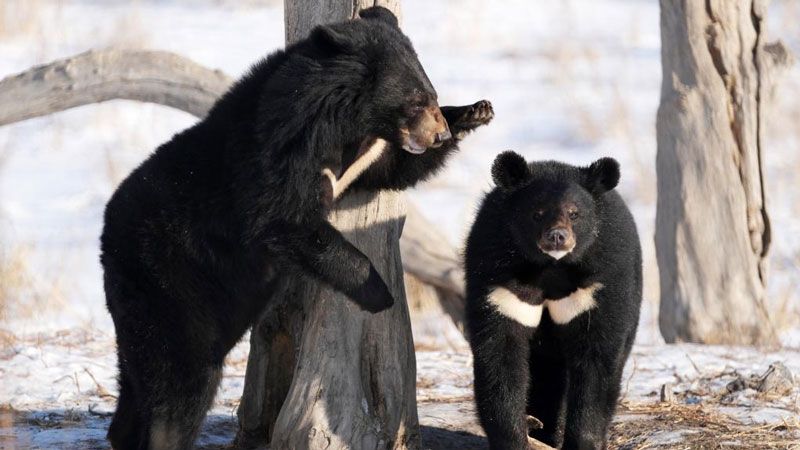Pic story: life of reindeer herder of Ewenki ethnic group in N China's Inner Mongolia
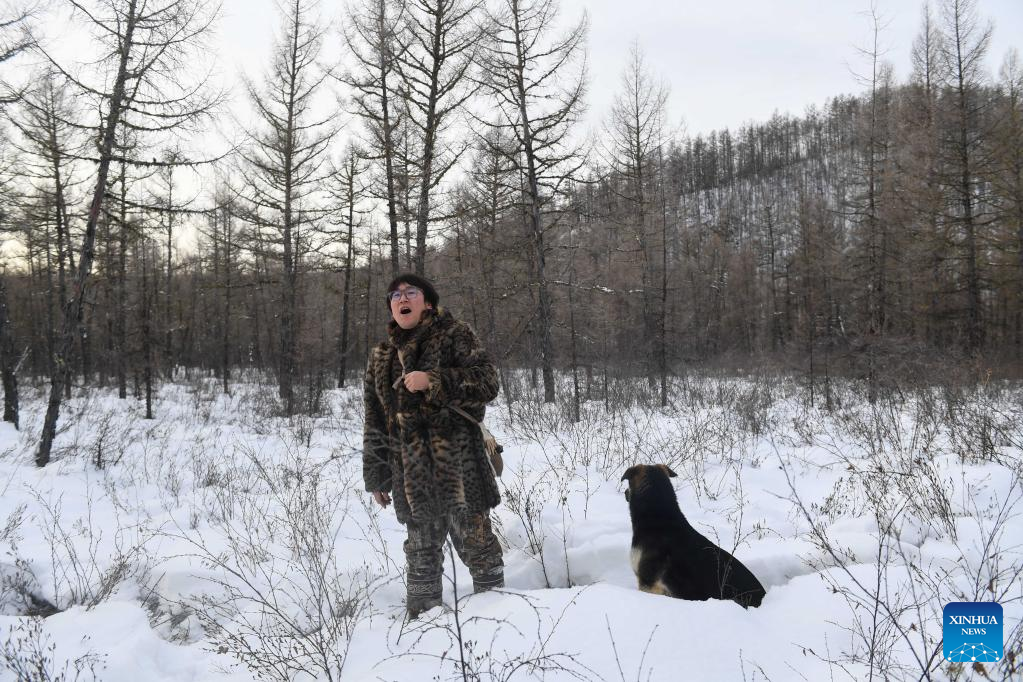
Juele calls his reindeer at the Jinhe forest range near Genhe City, north China's Inner Mongolia Autonomous Region, Jan. 12, 2023.
Every two or three days, Juele Bulituotian will head for the Jinhe forest range about 80 kilometers from Genhe City. That's where the 39-year-old Aoluguya Ewenki herder, wearing a traditional fur coat, will find his foraging reindeer.
Instead of keeping reindeer in a barn, Ewenki herders let the animals live in the forest and check on them every couple of days.
Juele owns over 60 reindeer. He will call his reindeer in the Ewenki language and wait for his reindeer to respond. To him, the jingles of deer bells sound like heaven, which mean his reindeer are around, safe and sound.
"I need to make sure my reindeer are not too far away, nor threatened by the predators in the forest." said Juele.
The Aoluguya Ewenki people, known as "the last hunting tribe in China," are the only ethnic minority group in China that raises reindeer.
Before moving into the house provided free of charge by the local government, Juele spent his childhood in the deep forest with his mom. He once worked in Beijing, capital of China, after graduating from school, but every time he sat alone, the jingles from home echoed in his mind.
He eventually returned to Aoluguya, his hometown, in 2015 and began to raise reindeer.
Life in the forest is hard and lonely, let alone the extreme coldness one needs to suffer. In winter, temperatures in Aoluguya could drop to minus 50 degrees Celsius, but for Aoluguya Ewenki herders like Juele, life must go on.
At the end of 2022, Juele spent over eight hours every day in the snowy forest, looking for his reindeer. After nine days of search, he finally found his herd on New Year's Day.
"To me, that's the best New Year gift, which also means 2023 will be an auspicious year," Juele said.
According to Juele, the life of the Aoluguya Ewenki people has improved a lot in recent years thanks to the local government. New homes were provided to them for free, and mobile lodges were built in the forests for them to keep warm as well. Besides, the government has been making every effort to promote tourism, hoping to boost incomes for the Ewenkis.
"I already make a good living on reindeer breeding and tourism," Juele said. However, he is looking forward to the summer, when more tourists can be expected after the impact of COVID-19 lessens. "The tourism here is going to recover at that time, that's for sure," said Juele with confidence. (Xinhua/Peng Yuan)
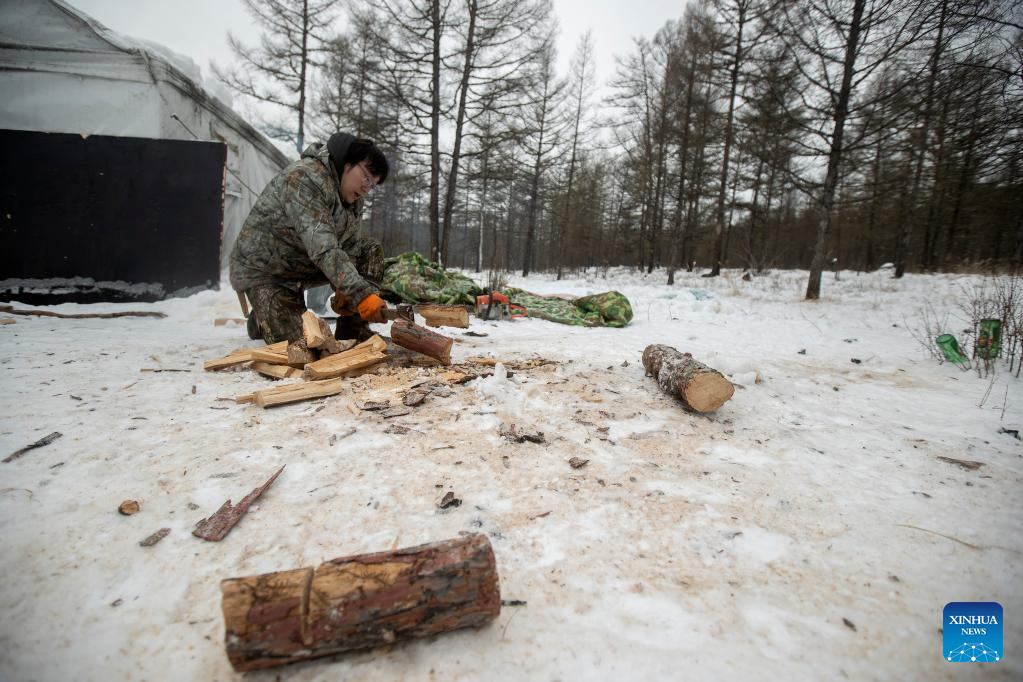
Juele chops up firewood at a temporary herding station at the Jinhe forest range near Genhe City, north China's Inner Mongolia Autonomous Region, Jan. 12, 2023.
Every two or three days, Juele Bulituotian will head for the Jinhe forest range about 80 kilometers from Genhe City. That's where the 39-year-old Aoluguya Ewenki herder, wearing a traditional fur coat, will find his foraging reindeer.
Instead of keeping reindeer in a barn, Ewenki herders let the animals live in the forest and check on them every couple of days.
Juele owns over 60 reindeer. He will call his reindeer in the Ewenki language and wait for his reindeer to respond. To him, the jingles of deer bells sound like heaven, which mean his reindeer are around, safe and sound.
"I need to make sure my reindeer are not too far away, nor threatened by the predators in the forest." said Juele.
The Aoluguya Ewenki people, known as "the last hunting tribe in China," are the only ethnic minority group in China that raises reindeer.
Before moving into the house provided free of charge by the local government, Juele spent his childhood in the deep forest with his mom. He once worked in Beijing, capital of China, after graduating from school, but every time he sat alone, the jingles from home echoed in his mind.
He eventually returned to Aoluguya, his hometown, in 2015 and began to raise reindeer.
Life in the forest is hard and lonely, let alone the extreme coldness one needs to suffer. In winter, temperatures in Aoluguya could drop to minus 50 degrees Celsius, but for Aoluguya Ewenki herders like Juele, life must go on.
At the end of 2022, Juele spent over eight hours every day in the snowy forest, looking for his reindeer. After nine days of search, he finally found his herd on New Year's Day.
"To me, that's the best New Year gift, which also means 2023 will be an auspicious year," Juele said.
According to Juele, the life of the Aoluguya Ewenki people has improved a lot in recent years thanks to the local government. New homes were provided to them for free, and mobile lodges were built in the forests for them to keep warm as well. Besides, the government has been making every effort to promote tourism, hoping to boost incomes for the Ewenkis.
"I already make a good living on reindeer breeding and tourism," Juele said. However, he is looking forward to the summer, when more tourists can be expected after the impact of COVID-19 lessens. "The tourism here is going to recover at that time, that's for sure," said Juele with confidence. (Xinhua/Fei Maohua)
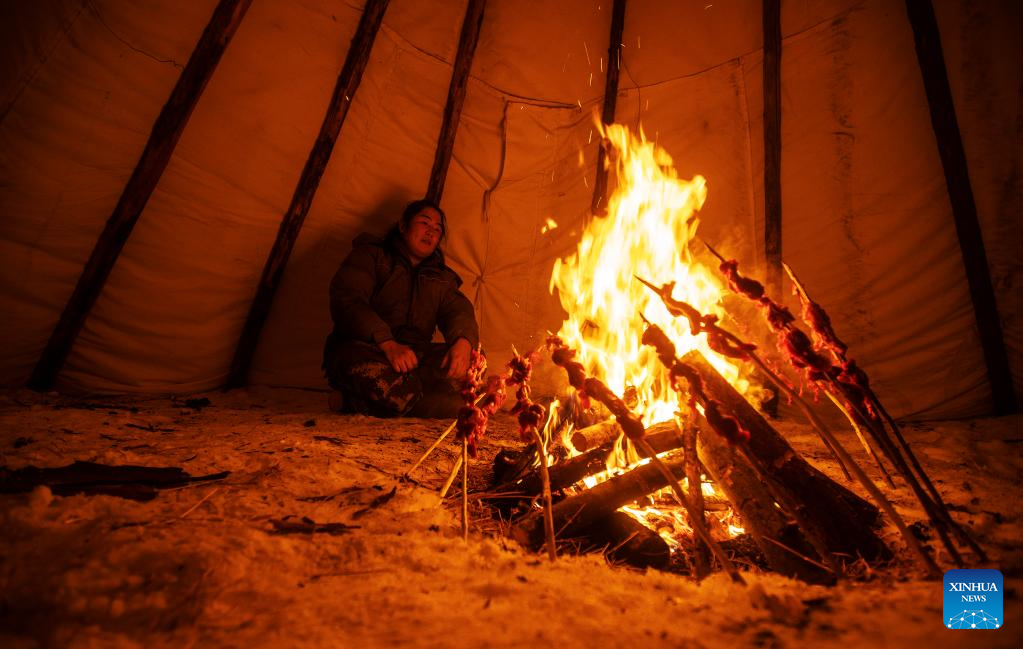
Dalinma, Juele's cousin, cooks roasted meat for dinner in a traditional Ewenki tent at a temporary herding station at the Jinhe forest range near Genhe City, north China's Inner Mongolia Autonomous Region, Jan. 11, 2023.
Every two or three days, Juele Bulituotian will head for the Jinhe forest range about 80 kilometers from Genhe City. That's where the 39-year-old Aoluguya Ewenki herder, wearing a traditional fur coat, will find his foraging reindeer.
Instead of keeping reindeer in a barn, Ewenki herders let the animals live in the forest and check on them every couple of days.
Juele owns over 60 reindeer. He will call his reindeer in the Ewenki language and wait for his reindeer to respond. To him, the jingles of deer bells sound like heaven, which mean his reindeer are around, safe and sound.
"I need to make sure my reindeer are not too far away, nor threatened by the predators in the forest." said Juele.
The Aoluguya Ewenki people, known as "the last hunting tribe in China," are the only ethnic minority group in China that raises reindeer.
Before moving into the house provided free of charge by the local government, Juele spent his childhood in the deep forest with his mom. He once worked in Beijing, capital of China, after graduating from school, but every time he sat alone, the jingles from home echoed in his mind.
He eventually returned to Aoluguya, his hometown, in 2015 and began to raise reindeer.
Life in the forest is hard and lonely, let alone the extreme coldness one needs to suffer. In winter, temperatures in Aoluguya could drop to minus 50 degrees Celsius, but for Aoluguya Ewenki herders like Juele, life must go on.
At the end of 2022, Juele spent over eight hours every day in the snowy forest, looking for his reindeer. After nine days of search, he finally found his herd on New Year's Day.
"To me, that's the best New Year gift, which also means 2023 will be an auspicious year," Juele said.
According to Juele, the life of the Aoluguya Ewenki people has improved a lot in recent years thanks to the local government. New homes were provided to them for free, and mobile lodges were built in the forests for them to keep warm as well. Besides, the government has been making every effort to promote tourism, hoping to boost incomes for the Ewenkis.
"I already make a good living on reindeer breeding and tourism," Juele said. However, he is looking forward to the summer, when more tourists can be expected after the impact of COVID-19 lessens. "The tourism here is going to recover at that time, that's for sure," said Juele with confidence. (Xinhua/Fei Maohua)
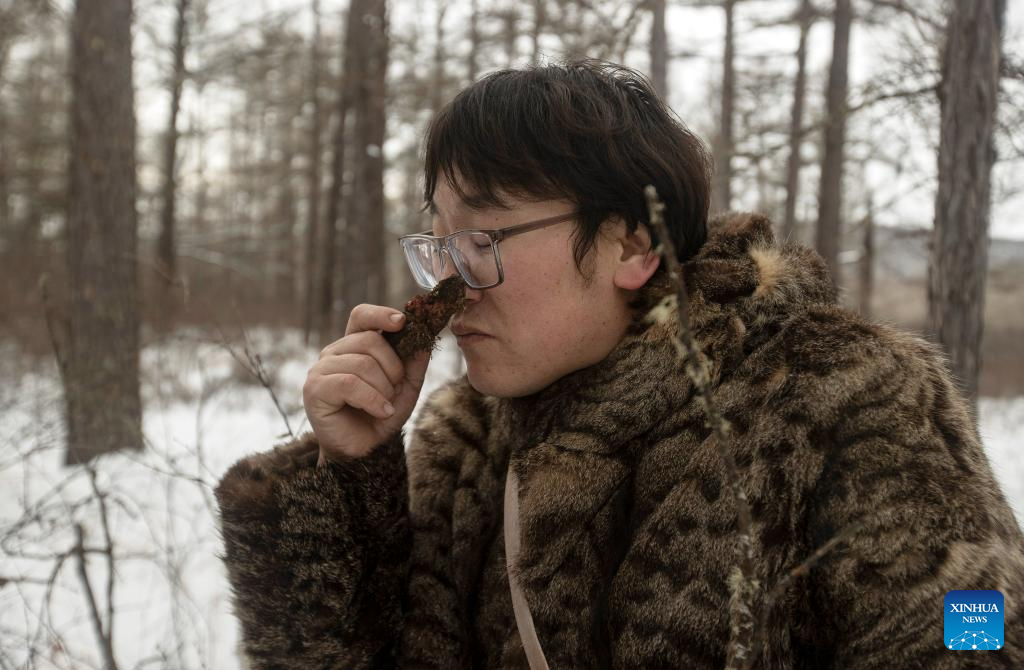
Juele smells a piece of tree bark at the Jinhe forest range near Genhe City, north China's Inner Mongolia Autonomous Region, Jan. 12, 2023.
Every two or three days, Juele Bulituotian will head for the Jinhe forest range about 80 kilometers from Genhe City. That's where the 39-year-old Aoluguya Ewenki herder, wearing a traditional fur coat, will find his foraging reindeer.
Instead of keeping reindeer in a barn, Ewenki herders let the animals live in the forest and check on them every couple of days.
Juele owns over 60 reindeer. He will call his reindeer in the Ewenki language and wait for his reindeer to respond. To him, the jingles of deer bells sound like heaven, which mean his reindeer are around, safe and sound.
"I need to make sure my reindeer are not too far away, nor threatened by the predators in the forest." said Juele.
The Aoluguya Ewenki people, known as "the last hunting tribe in China," are the only ethnic minority group in China that raises reindeer.
Before moving into the house provided free of charge by the local government, Juele spent his childhood in the deep forest with his mom. He once worked in Beijing, capital of China, after graduating from school, but every time he sat alone, the jingles from home echoed in his mind.
He eventually returned to Aoluguya, his hometown, in 2015 and began to raise reindeer.
Life in the forest is hard and lonely, let alone the extreme coldness one needs to suffer. In winter, temperatures in Aoluguya could drop to minus 50 degrees Celsius, but for Aoluguya Ewenki herders like Juele, life must go on.
At the end of 2022, Juele spent over eight hours every day in the snowy forest, looking for his reindeer. After nine days of search, he finally found his herd on New Year's Day.
"To me, that's the best New Year gift, which also means 2023 will be an auspicious year," Juele said.
According to Juele, the life of the Aoluguya Ewenki people has improved a lot in recent years thanks to the local government. New homes were provided to them for free, and mobile lodges were built in the forests for them to keep warm as well. Besides, the government has been making every effort to promote tourism, hoping to boost incomes for the Ewenkis.
"I already make a good living on reindeer breeding and tourism," Juele said. However, he is looking forward to the summer, when more tourists can be expected after the impact of COVID-19 lessens. "The tourism here is going to recover at that time, that's for sure," said Juele with confidence. (Xinhua/Fei Maohua)
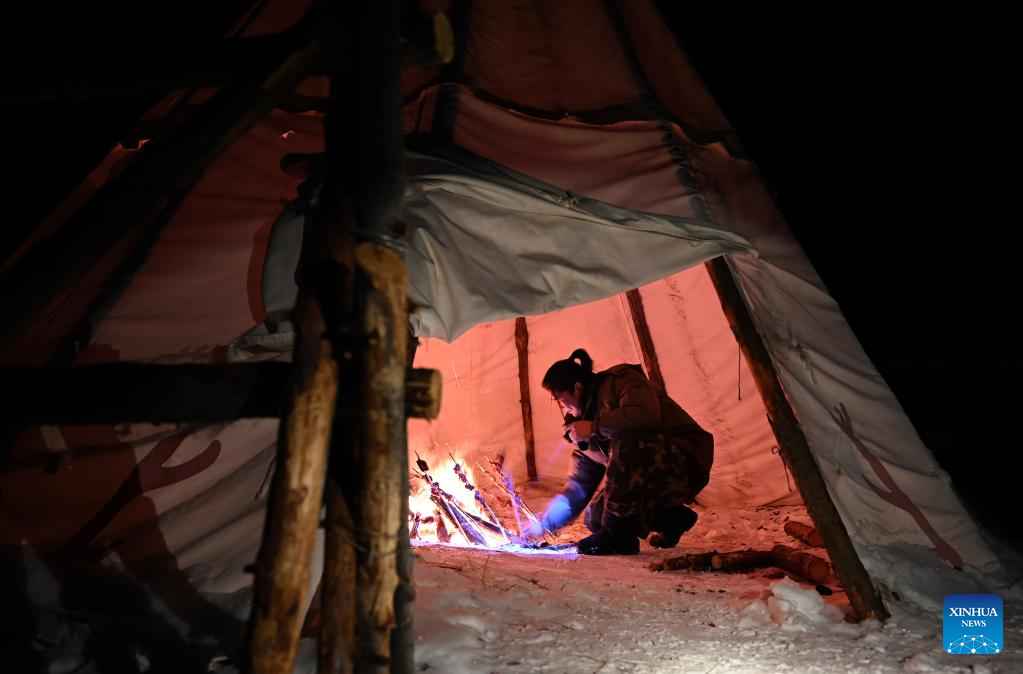
Dalinma, Juele's cousin, cooks kebabs in a traditional Ewenki tent at a temporary herding station at the Jinhe forest range near Genhe City, north China's Inner Mongolia Autonomous Region, Jan. 11, 2023.
Every two or three days, Juele Bulituotian will head for the Jinhe forest range about 80 kilometers from Genhe City. That's where the 39-year-old Aoluguya Ewenki herder, wearing a traditional fur coat, will find his foraging reindeer.
Instead of keeping reindeer in a barn, Ewenki herders let the animals live in the forest and check on them every couple of days.
Juele owns over 60 reindeer. He will call his reindeer in the Ewenki language and wait for his reindeer to respond. To him, the jingles of deer bells sound like heaven, which mean his reindeer are around, safe and sound.
"I need to make sure my reindeer are not too far away, nor threatened by the predators in the forest." said Juele.
The Aoluguya Ewenki people, known as "the last hunting tribe in China," are the only ethnic minority group in China that raises reindeer.
Before moving into the house provided free of charge by the local government, Juele spent his childhood in the deep forest with his mom. He once worked in Beijing, capital of China, after graduating from school, but every time he sat alone, the jingles from home echoed in his mind.
He eventually returned to Aoluguya, his hometown, in 2015 and began to raise reindeer.
Life in the forest is hard and lonely, let alone the extreme coldness one needs to suffer. In winter, temperatures in Aoluguya could drop to minus 50 degrees Celsius, but for Aoluguya Ewenki herders like Juele, life must go on.
At the end of 2022, Juele spent over eight hours every day in the snowy forest, looking for his reindeer. After nine days of search, he finally found his herd on New Year's Day.
"To me, that's the best New Year gift, which also means 2023 will be an auspicious year," Juele said.
According to Juele, the life of the Aoluguya Ewenki people has improved a lot in recent years thanks to the local government. New homes were provided to them for free, and mobile lodges were built in the forests for them to keep warm as well. Besides, the government has been making every effort to promote tourism, hoping to boost incomes for the Ewenkis.
"I already make a good living on reindeer breeding and tourism," Juele said. However, he is looking forward to the summer, when more tourists can be expected after the impact of COVID-19 lessens. "The tourism here is going to recover at that time, that's for sure," said Juele with confidence. (Xinhua/Ren Junchuan)

Juele feeds his reindeer at the Jinhe forest range near Genhe City, north China's Inner Mongolia Autonomous Region, Jan. 12, 2023.
Every two or three days, Juele Bulituotian will head for the Jinhe forest range about 80 kilometers from Genhe City. That's where the 39-year-old Aoluguya Ewenki herder, wearing a traditional fur coat, will find his foraging reindeer.
Instead of keeping reindeer in a barn, Ewenki herders let the animals live in the forest and check on them every couple of days.
Juele owns over 60 reindeer. He will call his reindeer in the Ewenki language and wait for his reindeer to respond. To him, the jingles of deer bells sound like heaven, which mean his reindeer are around, safe and sound.
"I need to make sure my reindeer are not too far away, nor threatened by the predators in the forest." said Juele.
The Aoluguya Ewenki people, known as "the last hunting tribe in China," are the only ethnic minority group in China that raises reindeer.
Before moving into the house provided free of charge by the local government, Juele spent his childhood in the deep forest with his mom. He once worked in Beijing, capital of China, after graduating from school, but every time he sat alone, the jingles from home echoed in his mind.
He eventually returned to Aoluguya, his hometown, in 2015 and began to raise reindeer.
Life in the forest is hard and lonely, let alone the extreme coldness one needs to suffer. In winter, temperatures in Aoluguya could drop to minus 50 degrees Celsius, but for Aoluguya Ewenki herders like Juele, life must go on.
At the end of 2022, Juele spent over eight hours every day in the snowy forest, looking for his reindeer. After nine days of search, he finally found his herd on New Year's Day.
"To me, that's the best New Year gift, which also means 2023 will be an auspicious year," Juele said.
According to Juele, the life of the Aoluguya Ewenki people has improved a lot in recent years thanks to the local government. New homes were provided to them for free, and mobile lodges were built in the forests for them to keep warm as well. Besides, the government has been making every effort to promote tourism, hoping to boost incomes for the Ewenkis.
"I already make a good living on reindeer breeding and tourism," Juele said. However, he is looking forward to the summer, when more tourists can be expected after the impact of COVID-19 lessens. "The tourism here is going to recover at that time, that's for sure," said Juele with confidence. (Xinhua/Peng Yuan)

Juele feeds his reindeer at the Jinhe forest range near Genhe City, north China's Inner Mongolia Autonomous Region, Jan. 12, 2023.
Every two or three days, Juele Bulituotian will head for the Jinhe forest range about 80 kilometers from Genhe City. That's where the 39-year-old Aoluguya Ewenki herder, wearing a traditional fur coat, will find his foraging reindeer.
Instead of keeping reindeer in a barn, Ewenki herders let the animals live in the forest and check on them every couple of days.
Juele owns over 60 reindeer. He will call his reindeer in the Ewenki language and wait for his reindeer to respond. To him, the jingles of deer bells sound like heaven, which mean his reindeer are around, safe and sound.
"I need to make sure my reindeer are not too far away, nor threatened by the predators in the forest." said Juele.
The Aoluguya Ewenki people, known as "the last hunting tribe in China," are the only ethnic minority group in China that raises reindeer.
Before moving into the house provided free of charge by the local government, Juele spent his childhood in the deep forest with his mom. He once worked in Beijing, capital of China, after graduating from school, but every time he sat alone, the jingles from home echoed in his mind.
He eventually returned to Aoluguya, his hometown, in 2015 and began to raise reindeer.
Life in the forest is hard and lonely, let alone the extreme coldness one needs to suffer. In winter, temperatures in Aoluguya could drop to minus 50 degrees Celsius, but for Aoluguya Ewenki herders like Juele, life must go on.
At the end of 2022, Juele spent over eight hours every day in the snowy forest, looking for his reindeer. After nine days of search, he finally found his herd on New Year's Day.
"To me, that's the best New Year gift, which also means 2023 will be an auspicious year," Juele said.
According to Juele, the life of the Aoluguya Ewenki people has improved a lot in recent years thanks to the local government. New homes were provided to them for free, and mobile lodges were built in the forests for them to keep warm as well. Besides, the government has been making every effort to promote tourism, hoping to boost incomes for the Ewenkis.
"I already make a good living on reindeer breeding and tourism," Juele said. However, he is looking forward to the summer, when more tourists can be expected after the impact of COVID-19 lessens. "The tourism here is going to recover at that time, that's for sure," said Juele with confidence. (Xinhua/Peng Yuan)
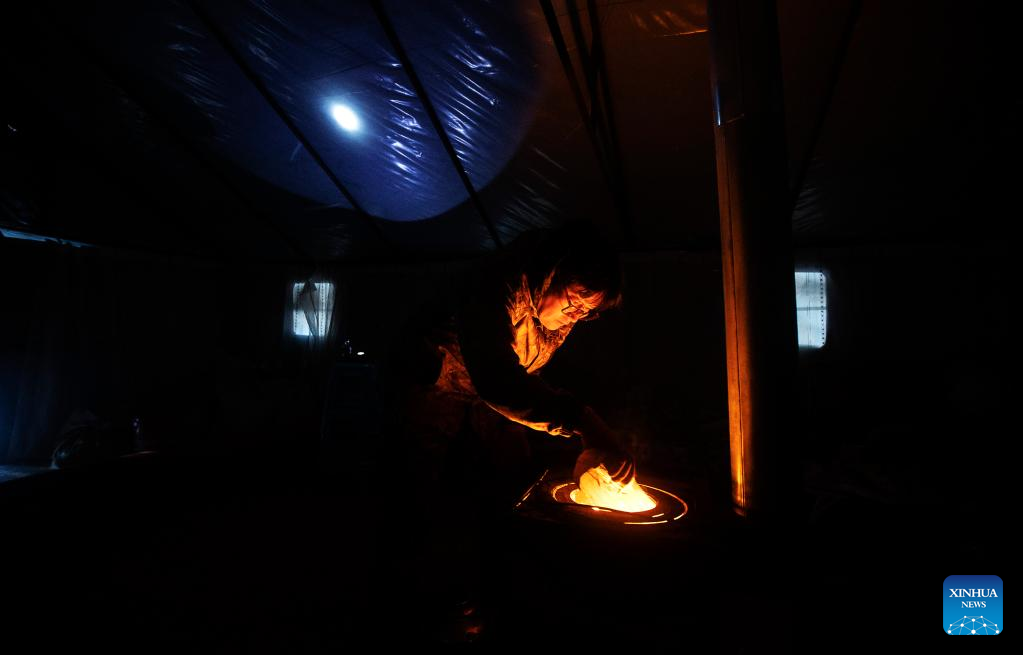
Juele boils milk tea in a tent before dawn at a temporary herding station at the Jinhe forest range near Genhe City, north China's Inner Mongolia Autonomous Region, Jan. 12, 2023.
Every two or three days, Juele Bulituotian will head for the Jinhe forest range about 80 kilometers from Genhe City. That's where the 39-year-old Aoluguya Ewenki herder, wearing a traditional fur coat, will find his foraging reindeer.
Instead of keeping reindeer in a barn, Ewenki herders let the animals live in the forest and check on them every couple of days.
Juele owns over 60 reindeer. He will call his reindeer in the Ewenki language and wait for his reindeer to respond. To him, the jingles of deer bells sound like heaven, which mean his reindeer are around, safe and sound.
"I need to make sure my reindeer are not too far away, nor threatened by the predators in the forest." said Juele.
The Aoluguya Ewenki people, known as "the last hunting tribe in China," are the only ethnic minority group in China that raises reindeer.
Before moving into the house provided free of charge by the local government, Juele spent his childhood in the deep forest with his mom. He once worked in Beijing, capital of China, after graduating from school, but every time he sat alone, the jingles from home echoed in his mind.
He eventually returned to Aoluguya, his hometown, in 2015 and began to raise reindeer.
Life in the forest is hard and lonely, let alone the extreme coldness one needs to suffer. In winter, temperatures in Aoluguya could drop to minus 50 degrees Celsius, but for Aoluguya Ewenki herders like Juele, life must go on.
At the end of 2022, Juele spent over eight hours every day in the snowy forest, looking for his reindeer. After nine days of search, he finally found his herd on New Year's Day.
"To me, that's the best New Year gift, which also means 2023 will be an auspicious year," Juele said.
According to Juele, the life of the Aoluguya Ewenki people has improved a lot in recent years thanks to the local government. New homes were provided to them for free, and mobile lodges were built in the forests for them to keep warm as well. Besides, the government has been making every effort to promote tourism, hoping to boost incomes for the Ewenkis.
"I already make a good living on reindeer breeding and tourism," Juele said. However, he is looking forward to the summer, when more tourists can be expected after the impact of COVID-19 lessens. "The tourism here is going to recover at that time, that's for sure," said Juele with confidence. (Xinhua/Fei Maohua)

This photo taken on Jan. 13, 2023 shows Juele with his family at a new relocation community in Aoluguya Ewenki Township, Genhe City of north China's Inner Mongolia Autonomous Region.
Every two or three days, Juele Bulituotian will head for the Jinhe forest range about 80 kilometers from Genhe City. That's where the 39-year-old Aoluguya Ewenki herder, wearing a traditional fur coat, will find his foraging reindeer.
Instead of keeping reindeer in a barn, Ewenki herders let the animals live in the forest and check on them every couple of days.
Juele owns over 60 reindeer. He will call his reindeer in the Ewenki language and wait for his reindeer to respond. To him, the jingles of deer bells sound like heaven, which mean his reindeer are around, safe and sound.
"I need to make sure my reindeer are not too far away, nor threatened by the predators in the forest." said Juele.
The Aoluguya Ewenki people, known as "the last hunting tribe in China," are the only ethnic minority group in China that raises reindeer.
Before moving into the house provided free of charge by the local government, Juele spent his childhood in the deep forest with his mom. He once worked in Beijing, capital of China, after graduating from school, but every time he sat alone, the jingles from home echoed in his mind.
He eventually returned to Aoluguya, his hometown, in 2015 and began to raise reindeer.
Life in the forest is hard and lonely, let alone the extreme coldness one needs to suffer. In winter, temperatures in Aoluguya could drop to minus 50 degrees Celsius, but for Aoluguya Ewenki herders like Juele, life must go on.
At the end of 2022, Juele spent over eight hours every day in the snowy forest, looking for his reindeer. After nine days of search, he finally found his herd on New Year's Day.
"To me, that's the best New Year gift, which also means 2023 will be an auspicious year," Juele said.
According to Juele, the life of the Aoluguya Ewenki people has improved a lot in recent years thanks to the local government. New homes were provided to them for free, and mobile lodges were built in the forests for them to keep warm as well. Besides, the government has been making every effort to promote tourism, hoping to boost incomes for the Ewenkis.
"I already make a good living on reindeer breeding and tourism," Juele said. However, he is looking forward to the summer, when more tourists can be expected after the impact of COVID-19 lessens. "The tourism here is going to recover at that time, that's for sure," said Juele with confidence. (Xinhua/Fei Maohua)

Juele bakes meat on a stove in a tent at a temporary herding station at the Jinhe forest range near Genhe City, north China's Inner Mongolia Autonomous Region, Jan. 12, 2023.
Every two or three days, Juele Bulituotian will head for the Jinhe forest range about 80 kilometers from Genhe City. That's where the 39-year-old Aoluguya Ewenki herder, wearing a traditional fur coat, will find his foraging reindeer.
Instead of keeping reindeer in a barn, Ewenki herders let the animals live in the forest and check on them every couple of days.
Juele owns over 60 reindeer. He will call his reindeer in the Ewenki language and wait for his reindeer to respond. To him, the jingles of deer bells sound like heaven, which mean his reindeer are around, safe and sound.
"I need to make sure my reindeer are not too far away, nor threatened by the predators in the forest." said Juele.
The Aoluguya Ewenki people, known as "the last hunting tribe in China," are the only ethnic minority group in China that raises reindeer.
Before moving into the house provided free of charge by the local government, Juele spent his childhood in the deep forest with his mom. He once worked in Beijing, capital of China, after graduating from school, but every time he sat alone, the jingles from home echoed in his mind.
He eventually returned to Aoluguya, his hometown, in 2015 and began to raise reindeer.
Life in the forest is hard and lonely, let alone the extreme coldness one needs to suffer. In winter, temperatures in Aoluguya could drop to minus 50 degrees Celsius, but for Aoluguya Ewenki herders like Juele, life must go on.
At the end of 2022, Juele spent over eight hours every day in the snowy forest, looking for his reindeer. After nine days of search, he finally found his herd on New Year's Day.
"To me, that's the best New Year gift, which also means 2023 will be an auspicious year," Juele said.
According to Juele, the life of the Aoluguya Ewenki people has improved a lot in recent years thanks to the local government. New homes were provided to them for free, and mobile lodges were built in the forests for them to keep warm as well. Besides, the government has been making every effort to promote tourism, hoping to boost incomes for the Ewenkis.
"I already make a good living on reindeer breeding and tourism," Juele said. However, he is looking forward to the summer, when more tourists can be expected after the impact of COVID-19 lessens. "The tourism here is going to recover at that time, that's for sure," said Juele with confidence. (Xinhua/Ren Junchuan)
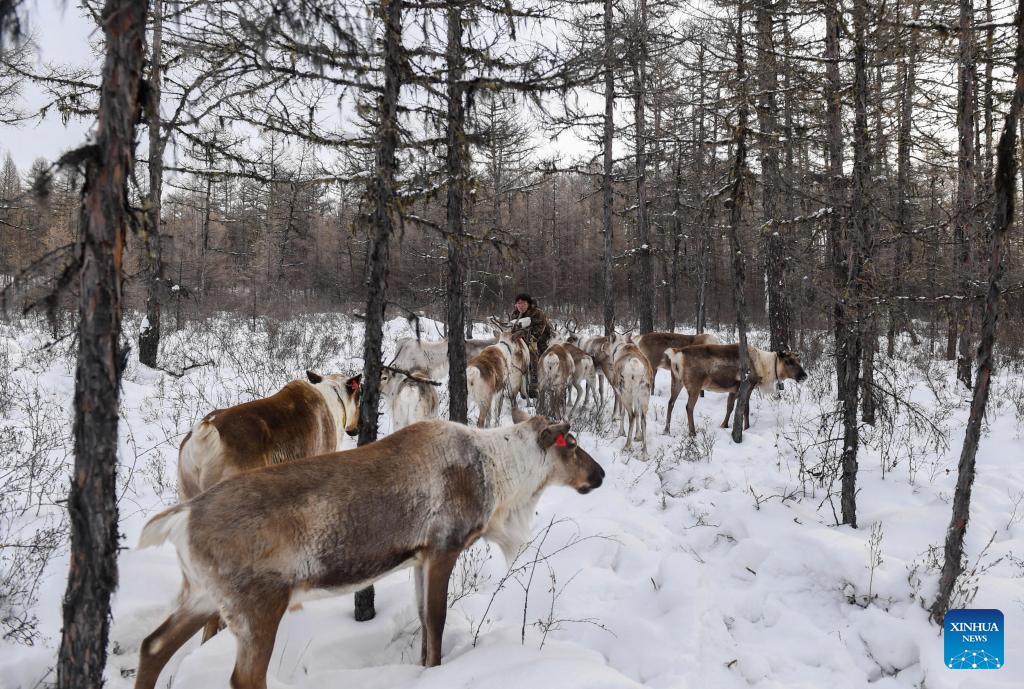
This photo taken on Jan. 12, 2023 shows Juele with his reindeer at the Jinhe forest range near Genhe City, north China's Inner Mongolia Autonomous Region.
Every two or three days, Juele Bulituotian will head for the Jinhe forest range about 80 kilometers from Genhe City. That's where the 39-year-old Aoluguya Ewenki herder, wearing a traditional fur coat, will find his foraging reindeer.
Instead of keeping reindeer in a barn, Ewenki herders let the animals live in the forest and check on them every couple of days.
Juele owns over 60 reindeer. He will call his reindeer in the Ewenki language and wait for his reindeer to respond. To him, the jingles of deer bells sound like heaven, which mean his reindeer are around, safe and sound.
"I need to make sure my reindeer are not too far away, nor threatened by the predators in the forest." said Juele.
The Aoluguya Ewenki people, known as "the last hunting tribe in China," are the only ethnic minority group in China that raises reindeer.
Before moving into the house provided free of charge by the local government, Juele spent his childhood in the deep forest with his mom. He once worked in Beijing, capital of China, after graduating from school, but every time he sat alone, the jingles from home echoed in his mind.
He eventually returned to Aoluguya, his hometown, in 2015 and began to raise reindeer.
Life in the forest is hard and lonely, let alone the extreme coldness one needs to suffer. In winter, temperatures in Aoluguya could drop to minus 50 degrees Celsius, but for Aoluguya Ewenki herders like Juele, life must go on.
At the end of 2022, Juele spent over eight hours every day in the snowy forest, looking for his reindeer. After nine days of search, he finally found his herd on New Year's Day.
"To me, that's the best New Year gift, which also means 2023 will be an auspicious year," Juele said.
According to Juele, the life of the Aoluguya Ewenki people has improved a lot in recent years thanks to the local government. New homes were provided to them for free, and mobile lodges were built in the forests for them to keep warm as well. Besides, the government has been making every effort to promote tourism, hoping to boost incomes for the Ewenkis.
"I already make a good living on reindeer breeding and tourism," Juele said. However, he is looking forward to the summer, when more tourists can be expected after the impact of COVID-19 lessens. "The tourism here is going to recover at that time, that's for sure," said Juele with confidence. (Xinhua/Peng Yuan)

Juele calls his reindeer at the Jinhe forest range near Genhe City, north China's Inner Mongolia Autonomous Region, Jan. 12, 2023.
Every two or three days, Juele Bulituotian will head for the Jinhe forest range about 80 kilometers from Genhe City. That's where the 39-year-old Aoluguya Ewenki herder, wearing a traditional fur coat, will find his foraging reindeer.
Instead of keeping reindeer in a barn, Ewenki herders let the animals live in the forest and check on them every couple of days.
Juele owns over 60 reindeer. He will call his reindeer in the Ewenki language and wait for his reindeer to respond. To him, the jingles of deer bells sound like heaven, which mean his reindeer are around, safe and sound.
"I need to make sure my reindeer are not too far away, nor threatened by the predators in the forest." said Juele.
The Aoluguya Ewenki people, known as "the last hunting tribe in China," are the only ethnic minority group in China that raises reindeer.
Before moving into the house provided free of charge by the local government, Juele spent his childhood in the deep forest with his mom. He once worked in Beijing, capital of China, after graduating from school, but every time he sat alone, the jingles from home echoed in his mind.
He eventually returned to Aoluguya, his hometown, in 2015 and began to raise reindeer.
Life in the forest is hard and lonely, let alone the extreme coldness one needs to suffer. In winter, temperatures in Aoluguya could drop to minus 50 degrees Celsius, but for Aoluguya Ewenki herders like Juele, life must go on.
At the end of 2022, Juele spent over eight hours every day in the snowy forest, looking for his reindeer. After nine days of search, he finally found his herd on New Year's Day.
"To me, that's the best New Year gift, which also means 2023 will be an auspicious year," Juele said.
According to Juele, the life of the Aoluguya Ewenki people has improved a lot in recent years thanks to the local government. New homes were provided to them for free, and mobile lodges were built in the forests for them to keep warm as well. Besides, the government has been making every effort to promote tourism, hoping to boost incomes for the Ewenkis.
"I already make a good living on reindeer breeding and tourism," Juele said. However, he is looking forward to the summer, when more tourists can be expected after the impact of COVID-19 lessens. "The tourism here is going to recover at that time, that's for sure," said Juele with confidence. (Xinhua/Fei Maohua)

This photo taken on Jan. 13, 2023 shows Juele with his family at a new relocation community in Aoluguya Ewenki Township, Genhe City of north China's Inner Mongolia Autonomous Region.
Every two or three days, Juele Bulituotian will head for the Jinhe forest range about 80 kilometers from Genhe City. That's where the 39-year-old Aoluguya Ewenki herder, wearing a traditional fur coat, will find his foraging reindeer.
Instead of keeping reindeer in a barn, Ewenki herders let the animals live in the forest and check on them every couple of days.
Juele owns over 60 reindeer. He will call his reindeer in the Ewenki language and wait for his reindeer to respond. To him, the jingles of deer bells sound like heaven, which mean his reindeer are around, safe and sound.
"I need to make sure my reindeer are not too far away, nor threatened by the predators in the forest." said Juele.
The Aoluguya Ewenki people, known as "the last hunting tribe in China," are the only ethnic minority group in China that raises reindeer.
Before moving into the house provided free of charge by the local government, Juele spent his childhood in the deep forest with his mom. He once worked in Beijing, capital of China, after graduating from school, but every time he sat alone, the jingles from home echoed in his mind.
He eventually returned to Aoluguya, his hometown, in 2015 and began to raise reindeer.
Life in the forest is hard and lonely, let alone the extreme coldness one needs to suffer. In winter, temperatures in Aoluguya could drop to minus 50 degrees Celsius, but for Aoluguya Ewenki herders like Juele, life must go on.
At the end of 2022, Juele spent over eight hours every day in the snowy forest, looking for his reindeer. After nine days of search, he finally found his herd on New Year's Day.
"To me, that's the best New Year gift, which also means 2023 will be an auspicious year," Juele said.
According to Juele, the life of the Aoluguya Ewenki people has improved a lot in recent years thanks to the local government. New homes were provided to them for free, and mobile lodges were built in the forests for them to keep warm as well. Besides, the government has been making every effort to promote tourism, hoping to boost incomes for the Ewenkis.
"I already make a good living on reindeer breeding and tourism," Juele said. However, he is looking forward to the summer, when more tourists can be expected after the impact of COVID-19 lessens. "The tourism here is going to recover at that time, that's for sure," said Juele with confidence. (Xinhua/Fei Maohua)

Juele feeds his reindeer at the Jinhe forest range near Genhe City, north China's Inner Mongolia Autonomous Region, Jan. 12, 2023.
Every two or three days, Juele Bulituotian will head for the Jinhe forest range about 80 kilometers from Genhe City. That's where the 39-year-old Aoluguya Ewenki herder, wearing a traditional fur coat, will find his foraging reindeer.
Instead of keeping reindeer in a barn, Ewenki herders let the animals live in the forest and check on them every couple of days.
Juele owns over 60 reindeer. He will call his reindeer in the Ewenki language and wait for his reindeer to respond. To him, the jingles of deer bells sound like heaven, which mean his reindeer are around, safe and sound.
"I need to make sure my reindeer are not too far away, nor threatened by the predators in the forest." said Juele.
The Aoluguya Ewenki people, known as "the last hunting tribe in China," are the only ethnic minority group in China that raises reindeer.
Before moving into the house provided free of charge by the local government, Juele spent his childhood in the deep forest with his mom. He once worked in Beijing, capital of China, after graduating from school, but every time he sat alone, the jingles from home echoed in his mind.
He eventually returned to Aoluguya, his hometown, in 2015 and began to raise reindeer.
Life in the forest is hard and lonely, let alone the extreme coldness one needs to suffer. In winter, temperatures in Aoluguya could drop to minus 50 degrees Celsius, but for Aoluguya Ewenki herders like Juele, life must go on.
At the end of 2022, Juele spent over eight hours every day in the snowy forest, looking for his reindeer. After nine days of search, he finally found his herd on New Year's Day.
"To me, that's the best New Year gift, which also means 2023 will be an auspicious year," Juele said.
According to Juele, the life of the Aoluguya Ewenki people has improved a lot in recent years thanks to the local government. New homes were provided to them for free, and mobile lodges were built in the forests for them to keep warm as well. Besides, the government has been making every effort to promote tourism, hoping to boost incomes for the Ewenkis.
"I already make a good living on reindeer breeding and tourism," Juele said. However, he is looking forward to the summer, when more tourists can be expected after the impact of COVID-19 lessens. "The tourism here is going to recover at that time, that's for sure," said Juele with confidence. (Xinhua/Fei Maohua)

Juele and his cousin Dalinma prepare to get some water at a temporary herding station at the Jinhe forest range near Genhe City, north China's Inner Mongolia Autonomous Region, Jan. 12, 2023.
Every two or three days, Juele Bulituotian will head for the Jinhe forest range about 80 kilometers from Genhe City. That's where the 39-year-old Aoluguya Ewenki herder, wearing a traditional fur coat, will find his foraging reindeer.
Instead of keeping reindeer in a barn, Ewenki herders let the animals live in the forest and check on them every couple of days.
Juele owns over 60 reindeer. He will call his reindeer in the Ewenki language and wait for his reindeer to respond. To him, the jingles of deer bells sound like heaven, which mean his reindeer are around, safe and sound.
"I need to make sure my reindeer are not too far away, nor threatened by the predators in the forest." said Juele.
The Aoluguya Ewenki people, known as "the last hunting tribe in China," are the only ethnic minority group in China that raises reindeer.
Before moving into the house provided free of charge by the local government, Juele spent his childhood in the deep forest with his mom. He once worked in Beijing, capital of China, after graduating from school, but every time he sat alone, the jingles from home echoed in his mind.
He eventually returned to Aoluguya, his hometown, in 2015 and began to raise reindeer.
Life in the forest is hard and lonely, let alone the extreme coldness one needs to suffer. In winter, temperatures in Aoluguya could drop to minus 50 degrees Celsius, but for Aoluguya Ewenki herders like Juele, life must go on.
At the end of 2022, Juele spent over eight hours every day in the snowy forest, looking for his reindeer. After nine days of search, he finally found his herd on New Year's Day.
"To me, that's the best New Year gift, which also means 2023 will be an auspicious year," Juele said.
According to Juele, the life of the Aoluguya Ewenki people has improved a lot in recent years thanks to the local government. New homes were provided to them for free, and mobile lodges were built in the forests for them to keep warm as well. Besides, the government has been making every effort to promote tourism, hoping to boost incomes for the Ewenkis.
"I already make a good living on reindeer breeding and tourism," Juele said. However, he is looking forward to the summer, when more tourists can be expected after the impact of COVID-19 lessens. "The tourism here is going to recover at that time, that's for sure," said Juele with confidence. (Xinhua/Peng Yuan)

Dalinma, Juele's cousin, cooks roasted meat for dinner in a traditional Ewenki tent at a temporary herding station at the Jinhe forest range near Genhe City, north China's Inner Mongolia Autonomous Region, Jan. 11, 2023.
Every two or three days, Juele Bulituotian will head for the Jinhe forest range about 80 kilometers from Genhe City. That's where the 39-year-old Aoluguya Ewenki herder, wearing a traditional fur coat, will find his foraging reindeer.
Instead of keeping reindeer in a barn, Ewenki herders let the animals live in the forest and check on them every couple of days.
Juele owns over 60 reindeer. He will call his reindeer in the Ewenki language and wait for his reindeer to respond. To him, the jingles of deer bells sound like heaven, which mean his reindeer are around, safe and sound.
"I need to make sure my reindeer are not too far away, nor threatened by the predators in the forest." said Juele.
The Aoluguya Ewenki people, known as "the last hunting tribe in China," are the only ethnic minority group in China that raises reindeer.
Before moving into the house provided free of charge by the local government, Juele spent his childhood in the deep forest with his mom. He once worked in Beijing, capital of China, after graduating from school, but every time he sat alone, the jingles from home echoed in his mind.
He eventually returned to Aoluguya, his hometown, in 2015 and began to raise reindeer.
Life in the forest is hard and lonely, let alone the extreme coldness one needs to suffer. In winter, temperatures in Aoluguya could drop to minus 50 degrees Celsius, but for Aoluguya Ewenki herders like Juele, life must go on.
At the end of 2022, Juele spent over eight hours every day in the snowy forest, looking for his reindeer. After nine days of search, he finally found his herd on New Year's Day.
"To me, that's the best New Year gift, which also means 2023 will be an auspicious year," Juele said.
According to Juele, the life of the Aoluguya Ewenki people has improved a lot in recent years thanks to the local government. New homes were provided to them for free, and mobile lodges were built in the forests for them to keep warm as well. Besides, the government has been making every effort to promote tourism, hoping to boost incomes for the Ewenkis.
"I already make a good living on reindeer breeding and tourism," Juele said. However, he is looking forward to the summer, when more tourists can be expected after the impact of COVID-19 lessens. "The tourism here is going to recover at that time, that's for sure," said Juele with confidence. (Xinhua/Fei Maohua)

Juele looks for his reindeer at the Jinhe forest range near Genhe City, north China's Inner Mongolia Autonomous Region, Jan. 12, 2023.
Every two or three days, Juele Bulituotian will head for the Jinhe forest range about 80 kilometers from Genhe City. That's where the 39-year-old Aoluguya Ewenki herder, wearing a traditional fur coat, will find his foraging reindeer.
Instead of keeping reindeer in a barn, Ewenki herders let the animals live in the forest and check on them every couple of days.
Juele owns over 60 reindeer. He will call his reindeer in the Ewenki language and wait for his reindeer to respond. To him, the jingles of deer bells sound like heaven, which mean his reindeer are around, safe and sound.
"I need to make sure my reindeer are not too far away, nor threatened by the predators in the forest." said Juele.
The Aoluguya Ewenki people, known as "the last hunting tribe in China," are the only ethnic minority group in China that raises reindeer.
Before moving into the house provided free of charge by the local government, Juele spent his childhood in the deep forest with his mom. He once worked in Beijing, capital of China, after graduating from school, but every time he sat alone, the jingles from home echoed in his mind.
He eventually returned to Aoluguya, his hometown, in 2015 and began to raise reindeer.
Life in the forest is hard and lonely, let alone the extreme coldness one needs to suffer. In winter, temperatures in Aoluguya could drop to minus 50 degrees Celsius, but for Aoluguya Ewenki herders like Juele, life must go on.
At the end of 2022, Juele spent over eight hours every day in the snowy forest, looking for his reindeer. After nine days of search, he finally found his herd on New Year's Day.
"To me, that's the best New Year gift, which also means 2023 will be an auspicious year," Juele said.
According to Juele, the life of the Aoluguya Ewenki people has improved a lot in recent years thanks to the local government. New homes were provided to them for free, and mobile lodges were built in the forests for them to keep warm as well. Besides, the government has been making every effort to promote tourism, hoping to boost incomes for the Ewenkis.
"I already make a good living on reindeer breeding and tourism," Juele said. However, he is looking forward to the summer, when more tourists can be expected after the impact of COVID-19 lessens. "The tourism here is going to recover at that time, that's for sure," said Juele with confidence. (Xinhua/Peng Yuan)

Juele finally finds his reindeer after two hours of search at the Jinhe forest range near Genhe City, north China's Inner Mongolia Autonomous Region, Jan. 12, 2023.
Every two or three days, Juele Bulituotian will head for the Jinhe forest range about 80 kilometers from Genhe City. That's where the 39-year-old Aoluguya Ewenki herder, wearing a traditional fur coat, will find his foraging reindeer.
Instead of keeping reindeer in a barn, Ewenki herders let the animals live in the forest and check on them every couple of days.
Juele owns over 60 reindeer. He will call his reindeer in the Ewenki language and wait for his reindeer to respond. To him, the jingles of deer bells sound like heaven, which mean his reindeer are around, safe and sound.
"I need to make sure my reindeer are not too far away, nor threatened by the predators in the forest." said Juele.
The Aoluguya Ewenki people, known as "the last hunting tribe in China," are the only ethnic minority group in China that raises reindeer.
Before moving into the house provided free of charge by the local government, Juele spent his childhood in the deep forest with his mom. He once worked in Beijing, capital of China, after graduating from school, but every time he sat alone, the jingles from home echoed in his mind.
He eventually returned to Aoluguya, his hometown, in 2015 and began to raise reindeer.
Life in the forest is hard and lonely, let alone the extreme coldness one needs to suffer. In winter, temperatures in Aoluguya could drop to minus 50 degrees Celsius, but for Aoluguya Ewenki herders like Juele, life must go on.
At the end of 2022, Juele spent over eight hours every day in the snowy forest, looking for his reindeer. After nine days of search, he finally found his herd on New Year's Day.
"To me, that's the best New Year gift, which also means 2023 will be an auspicious year," Juele said.
According to Juele, the life of the Aoluguya Ewenki people has improved a lot in recent years thanks to the local government. New homes were provided to them for free, and mobile lodges were built in the forests for them to keep warm as well. Besides, the government has been making every effort to promote tourism, hoping to boost incomes for the Ewenkis.
"I already make a good living on reindeer breeding and tourism," Juele said. However, he is looking forward to the summer, when more tourists can be expected after the impact of COVID-19 lessens. "The tourism here is going to recover at that time, that's for sure," said Juele with confidence. (Xinhua/Fei Maohua)
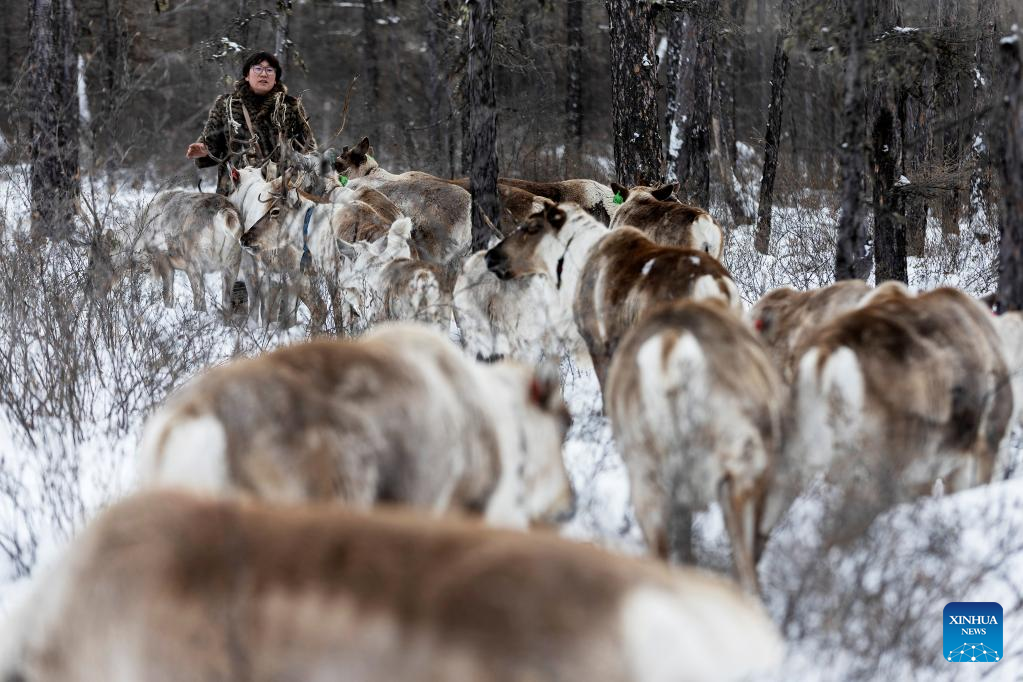
This photo taken on Jan. 12, 2023 shows Juele with his reindeer at the Jinhe forest range near Genhe City, north China's Inner Mongolia Autonomous Region.
Every two or three days, Juele Bulituotian will head for the Jinhe forest range about 80 kilometers from Genhe City. That's where the 39-year-old Aoluguya Ewenki herder, wearing a traditional fur coat, will find his foraging reindeer.
Instead of keeping reindeer in a barn, Ewenki herders let the animals live in the forest and check on them every couple of days.
Juele owns over 60 reindeer. He will call his reindeer in the Ewenki language and wait for his reindeer to respond. To him, the jingles of deer bells sound like heaven, which mean his reindeer are around, safe and sound.
"I need to make sure my reindeer are not too far away, nor threatened by the predators in the forest." said Juele.
The Aoluguya Ewenki people, known as "the last hunting tribe in China," are the only ethnic minority group in China that raises reindeer.
Before moving into the house provided free of charge by the local government, Juele spent his childhood in the deep forest with his mom. He once worked in Beijing, capital of China, after graduating from school, but every time he sat alone, the jingles from home echoed in his mind.
He eventually returned to Aoluguya, his hometown, in 2015 and began to raise reindeer.
Life in the forest is hard and lonely, let alone the extreme coldness one needs to suffer. In winter, temperatures in Aoluguya could drop to minus 50 degrees Celsius, but for Aoluguya Ewenki herders like Juele, life must go on.
At the end of 2022, Juele spent over eight hours every day in the snowy forest, looking for his reindeer. After nine days of search, he finally found his herd on New Year's Day.
"To me, that's the best New Year gift, which also means 2023 will be an auspicious year," Juele said.
According to Juele, the life of the Aoluguya Ewenki people has improved a lot in recent years thanks to the local government. New homes were provided to them for free, and mobile lodges were built in the forests for them to keep warm as well. Besides, the government has been making every effort to promote tourism, hoping to boost incomes for the Ewenkis.
"I already make a good living on reindeer breeding and tourism," Juele said. However, he is looking forward to the summer, when more tourists can be expected after the impact of COVID-19 lessens. "The tourism here is going to recover at that time, that's for sure," said Juele with confidence. (Xinhua/Fei Maohua)

This photo taken on Jan. 11, 2023 shows a traditional Ewenki tent at a temporary herding station at the Jinhe forest range near Genhe City, north China's Inner Mongolia Autonomous Region.
Every two or three days, Juele Bulituotian will head for the Jinhe forest range about 80 kilometers from Genhe City. That's where the 39-year-old Aoluguya Ewenki herder, wearing a traditional fur coat, will find his foraging reindeer.
Instead of keeping reindeer in a barn, Ewenki herders let the animals live in the forest and check on them every couple of days.
Juele owns over 60 reindeer. He will call his reindeer in the Ewenki language and wait for his reindeer to respond. To him, the jingles of deer bells sound like heaven, which mean his reindeer are around, safe and sound.
"I need to make sure my reindeer are not too far away, nor threatened by the predators in the forest." said Juele.
The Aoluguya Ewenki people, known as "the last hunting tribe in China," are the only ethnic minority group in China that raises reindeer.
Before moving into the house provided free of charge by the local government, Juele spent his childhood in the deep forest with his mom. He once worked in Beijing, capital of China, after graduating from school, but every time he sat alone, the jingles from home echoed in his mind.
He eventually returned to Aoluguya, his hometown, in 2015 and began to raise reindeer.
Life in the forest is hard and lonely, let alone the extreme coldness one needs to suffer. In winter, temperatures in Aoluguya could drop to minus 50 degrees Celsius, but for Aoluguya Ewenki herders like Juele, life must go on.
At the end of 2022, Juele spent over eight hours every day in the snowy forest, looking for his reindeer. After nine days of search, he finally found his herd on New Year's Day.
"To me, that's the best New Year gift, which also means 2023 will be an auspicious year," Juele said.
According to Juele, the life of the Aoluguya Ewenki people has improved a lot in recent years thanks to the local government. New homes were provided to them for free, and mobile lodges were built in the forests for them to keep warm as well. Besides, the government has been making every effort to promote tourism, hoping to boost incomes for the Ewenkis.
"I already make a good living on reindeer breeding and tourism," Juele said. However, he is looking forward to the summer, when more tourists can be expected after the impact of COVID-19 lessens. "The tourism here is going to recover at that time, that's for sure," said Juele with confidence. (Xinhua/Fei Maohua)

This photo taken on Jan. 13, 2023 shows Juele with his kid at a new relocation community in Aoluguya Ewenki Township in Genhe City, north China's Inner Mongolia Autonomous Region.
Every two or three days, Juele Bulituotian will head for the Jinhe forest range about 80 kilometers from Genhe City. That's where the 39-year-old Aoluguya Ewenki herder, wearing a traditional fur coat, will find his foraging reindeer.
Instead of keeping reindeer in a barn, Ewenki herders let the animals live in the forest and check on them every couple of days.
Juele owns over 60 reindeer. He will call his reindeer in the Ewenki language and wait for his reindeer to respond. To him, the jingles of deer bells sound like heaven, which mean his reindeer are around, safe and sound.
"I need to make sure my reindeer are not too far away, nor threatened by the predators in the forest." said Juele.
The Aoluguya Ewenki people, known as "the last hunting tribe in China," are the only ethnic minority group in China that raises reindeer.
Before moving into the house provided free of charge by the local government, Juele spent his childhood in the deep forest with his mom. He once worked in Beijing, capital of China, after graduating from school, but every time he sat alone, the jingles from home echoed in his mind.
He eventually returned to Aoluguya, his hometown, in 2015 and began to raise reindeer.
Life in the forest is hard and lonely, let alone the extreme coldness one needs to suffer. In winter, temperatures in Aoluguya could drop to minus 50 degrees Celsius, but for Aoluguya Ewenki herders like Juele, life must go on.
At the end of 2022, Juele spent over eight hours every day in the snowy forest, looking for his reindeer. After nine days of search, he finally found his herd on New Year's Day.
"To me, that's the best New Year gift, which also means 2023 will be an auspicious year," Juele said.
According to Juele, the life of the Aoluguya Ewenki people has improved a lot in recent years thanks to the local government. New homes were provided to them for free, and mobile lodges were built in the forests for them to keep warm as well. Besides, the government has been making every effort to promote tourism, hoping to boost incomes for the Ewenkis.
"I already make a good living on reindeer breeding and tourism," Juele said. However, he is looking forward to the summer, when more tourists can be expected after the impact of COVID-19 lessens. "The tourism here is going to recover at that time, that's for sure," said Juele with confidence. (Xinhua/Ren Junchuan)

Dalinma, Juele's cousin, takes care of a sick reindeer at the Jinhe forest range near Genhe City, north China's Inner Mongolia Autonomous Region, Jan. 12, 2023.
Every two or three days, Juele Bulituotian will head for the Jinhe forest range about 80 kilometers from Genhe City. That's where the 39-year-old Aoluguya Ewenki herder, wearing a traditional fur coat, will find his foraging reindeer.
Instead of keeping reindeer in a barn, Ewenki herders let the animals live in the forest and check on them every couple of days.
Juele owns over 60 reindeer. He will call his reindeer in the Ewenki language and wait for his reindeer to respond. To him, the jingles of deer bells sound like heaven, which mean his reindeer are around, safe and sound.
"I need to make sure my reindeer are not too far away, nor threatened by the predators in the forest." said Juele.
The Aoluguya Ewenki people, known as "the last hunting tribe in China," are the only ethnic minority group in China that raises reindeer.
Before moving into the house provided free of charge by the local government, Juele spent his childhood in the deep forest with his mom. He once worked in Beijing, capital of China, after graduating from school, but every time he sat alone, the jingles from home echoed in his mind.
He eventually returned to Aoluguya, his hometown, in 2015 and began to raise reindeer.
Life in the forest is hard and lonely, let alone the extreme coldness one needs to suffer. In winter, temperatures in Aoluguya could drop to minus 50 degrees Celsius, but for Aoluguya Ewenki herders like Juele, life must go on.
At the end of 2022, Juele spent over eight hours every day in the snowy forest, looking for his reindeer. After nine days of search, he finally found his herd on New Year's Day.
"To me, that's the best New Year gift, which also means 2023 will be an auspicious year," Juele said.
According to Juele, the life of the Aoluguya Ewenki people has improved a lot in recent years thanks to the local government. New homes were provided to them for free, and mobile lodges were built in the forests for them to keep warm as well. Besides, the government has been making every effort to promote tourism, hoping to boost incomes for the Ewenkis.
"I already make a good living on reindeer breeding and tourism," Juele said. However, he is looking forward to the summer, when more tourists can be expected after the impact of COVID-19 lessens. "The tourism here is going to recover at that time, that's for sure," said Juele with confidence. (Xinhua/Peng Yuan)
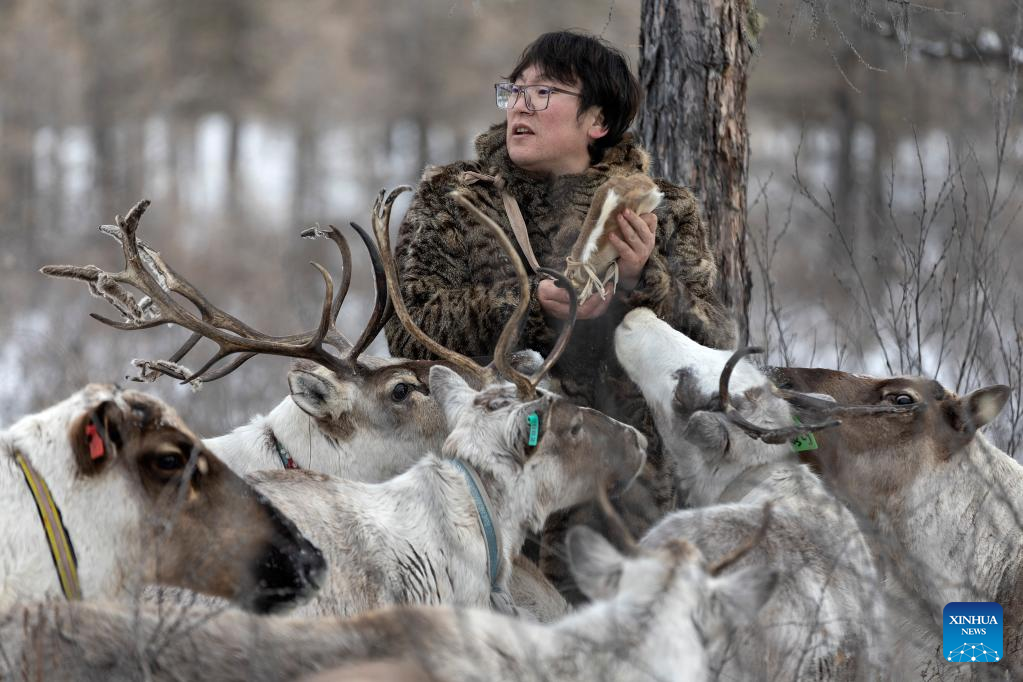
Juele feeds his reindeer at the Jinhe forest range near Genhe City, north China's Inner Mongolia Autonomous Region, Jan. 12, 2023.
Every two or three days, Juele Bulituotian will head for the Jinhe forest range about 80 kilometers from Genhe City. That's where the 39-year-old Aoluguya Ewenki herder, wearing a traditional fur coat, will find his foraging reindeer.
Instead of keeping reindeer in a barn, Ewenki herders let the animals live in the forest and check on them every couple of days.
Juele owns over 60 reindeer. He will call his reindeer in the Ewenki language and wait for his reindeer to respond. To him, the jingles of deer bells sound like heaven, which mean his reindeer are around, safe and sound.
"I need to make sure my reindeer are not too far away, nor threatened by the predators in the forest." said Juele.
The Aoluguya Ewenki people, known as "the last hunting tribe in China," are the only ethnic minority group in China that raises reindeer.
Before moving into the house provided free of charge by the local government, Juele spent his childhood in the deep forest with his mom. He once worked in Beijing, capital of China, after graduating from school, but every time he sat alone, the jingles from home echoed in his mind.
He eventually returned to Aoluguya, his hometown, in 2015 and began to raise reindeer.
Life in the forest is hard and lonely, let alone the extreme coldness one needs to suffer. In winter, temperatures in Aoluguya could drop to minus 50 degrees Celsius, but for Aoluguya Ewenki herders like Juele, life must go on.
At the end of 2022, Juele spent over eight hours every day in the snowy forest, looking for his reindeer. After nine days of search, he finally found his herd on New Year's Day.
"To me, that's the best New Year gift, which also means 2023 will be an auspicious year," Juele said.
According to Juele, the life of the Aoluguya Ewenki people has improved a lot in recent years thanks to the local government. New homes were provided to them for free, and mobile lodges were built in the forests for them to keep warm as well. Besides, the government has been making every effort to promote tourism, hoping to boost incomes for the Ewenkis.
"I already make a good living on reindeer breeding and tourism," Juele said. However, he is looking forward to the summer, when more tourists can be expected after the impact of COVID-19 lessens. "The tourism here is going to recover at that time, that's for sure," said Juele with confidence. (Xinhua/Fei Maohua)
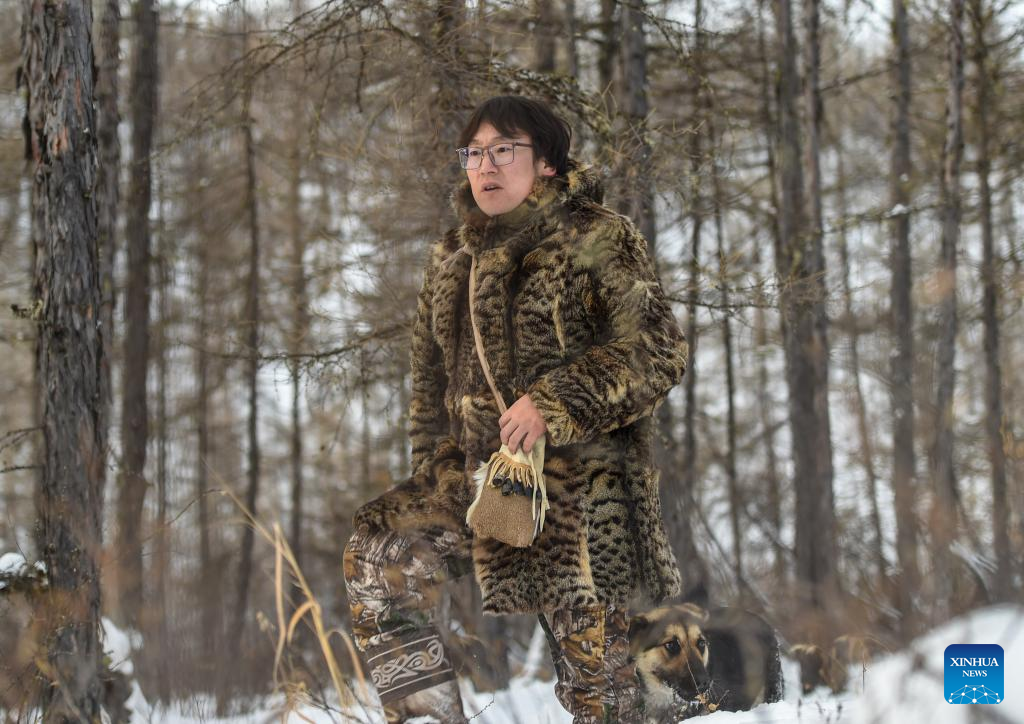
Juele looks for his reindeer at the Jinhe forest range near Genhe City, north China's Inner Mongolia Autonomous Region, Jan. 12, 2023.
Every two or three days, Juele Bulituotian will head for the Jinhe forest range about 80 kilometers from Genhe City. That's where the 39-year-old Aoluguya Ewenki herder, wearing a traditional fur coat, will find his foraging reindeer.
Instead of keeping reindeer in a barn, Ewenki herders let the animals live in the forest and check on them every couple of days.
Juele owns over 60 reindeer. He will call his reindeer in the Ewenki language and wait for his reindeer to respond. To him, the jingles of deer bells sound like heaven, which mean his reindeer are around, safe and sound.
"I need to make sure my reindeer are not too far away, nor threatened by the predators in the forest." said Juele.
The Aoluguya Ewenki people, known as "the last hunting tribe in China," are the only ethnic minority group in China that raises reindeer.
Before moving into the house provided free of charge by the local government, Juele spent his childhood in the deep forest with his mom. He once worked in Beijing, capital of China, after graduating from school, but every time he sat alone, the jingles from home echoed in his mind.
He eventually returned to Aoluguya, his hometown, in 2015 and began to raise reindeer.
Life in the forest is hard and lonely, let alone the extreme coldness one needs to suffer. In winter, temperatures in Aoluguya could drop to minus 50 degrees Celsius, but for Aoluguya Ewenki herders like Juele, life must go on.
At the end of 2022, Juele spent over eight hours every day in the snowy forest, looking for his reindeer. After nine days of search, he finally found his herd on New Year's Day.
"To me, that's the best New Year gift, which also means 2023 will be an auspicious year," Juele said.
According to Juele, the life of the Aoluguya Ewenki people has improved a lot in recent years thanks to the local government. New homes were provided to them for free, and mobile lodges were built in the forests for them to keep warm as well. Besides, the government has been making every effort to promote tourism, hoping to boost incomes for the Ewenkis.
"I already make a good living on reindeer breeding and tourism," Juele said. However, he is looking forward to the summer, when more tourists can be expected after the impact of COVID-19 lessens. "The tourism here is going to recover at that time, that's for sure," said Juele with confidence. (Xinhua/Peng Yuan)

Juele checks a kind of moss growing on trees, one of the favorite foods of reindeer, at the Jinhe forest range near Genhe City, north China's Inner Mongolia Autonomous Region, Jan. 12, 2023.
Every two or three days, Juele Bulituotian will head for the Jinhe forest range about 80 kilometers from Genhe City. That's where the 39-year-old Aoluguya Ewenki herder, wearing a traditional fur coat, will find his foraging reindeer.
Instead of keeping reindeer in a barn, Ewenki herders let the animals live in the forest and check on them every couple of days.
Juele owns over 60 reindeer. He will call his reindeer in the Ewenki language and wait for his reindeer to respond. To him, the jingles of deer bells sound like heaven, which mean his reindeer are around, safe and sound.
"I need to make sure my reindeer are not too far away, nor threatened by the predators in the forest." said Juele.
The Aoluguya Ewenki people, known as "the last hunting tribe in China," are the only ethnic minority group in China that raises reindeer.
Before moving into the house provided free of charge by the local government, Juele spent his childhood in the deep forest with his mom. He once worked in Beijing, capital of China, after graduating from school, but every time he sat alone, the jingles from home echoed in his mind.
He eventually returned to Aoluguya, his hometown, in 2015 and began to raise reindeer.
Life in the forest is hard and lonely, let alone the extreme coldness one needs to suffer. In winter, temperatures in Aoluguya could drop to minus 50 degrees Celsius, but for Aoluguya Ewenki herders like Juele, life must go on.
At the end of 2022, Juele spent over eight hours every day in the snowy forest, looking for his reindeer. After nine days of search, he finally found his herd on New Year's Day.
"To me, that's the best New Year gift, which also means 2023 will be an auspicious year," Juele said.
According to Juele, the life of the Aoluguya Ewenki people has improved a lot in recent years thanks to the local government. New homes were provided to them for free, and mobile lodges were built in the forests for them to keep warm as well. Besides, the government has been making every effort to promote tourism, hoping to boost incomes for the Ewenkis.
"I already make a good living on reindeer breeding and tourism," Juele said. However, he is looking forward to the summer, when more tourists can be expected after the impact of COVID-19 lessens. "The tourism here is going to recover at that time, that's for sure," said Juele with confidence. (Xinhua/Fei Maohua)

Dalinma, Juele's cousin, prepares to feed a sick reindeer at a temporary herding station at the Jinhe forest range near Genhe City, north China's Inner Mongolia Autonomous Region, Jan. 12, 2023.
Every two or three days, Juele Bulituotian will head for the Jinhe forest range about 80 kilometers from Genhe City. That's where the 39-year-old Aoluguya Ewenki herder, wearing a traditional fur coat, will find his foraging reindeer.
Instead of keeping reindeer in a barn, Ewenki herders let the animals live in the forest and check on them every couple of days.
Juele owns over 60 reindeer. He will call his reindeer in the Ewenki language and wait for his reindeer to respond. To him, the jingles of deer bells sound like heaven, which mean his reindeer are around, safe and sound.
"I need to make sure my reindeer are not too far away, nor threatened by the predators in the forest." said Juele.
The Aoluguya Ewenki people, known as "the last hunting tribe in China," are the only ethnic minority group in China that raises reindeer.
Before moving into the house provided free of charge by the local government, Juele spent his childhood in the deep forest with his mom. He once worked in Beijing, capital of China, after graduating from school, but every time he sat alone, the jingles from home echoed in his mind.
He eventually returned to Aoluguya, his hometown, in 2015 and began to raise reindeer.
Life in the forest is hard and lonely, let alone the extreme coldness one needs to suffer. In winter, temperatures in Aoluguya could drop to minus 50 degrees Celsius, but for Aoluguya Ewenki herders like Juele, life must go on.
At the end of 2022, Juele spent over eight hours every day in the snowy forest, looking for his reindeer. After nine days of search, he finally found his herd on New Year's Day.
"To me, that's the best New Year gift, which also means 2023 will be an auspicious year," Juele said.
According to Juele, the life of the Aoluguya Ewenki people has improved a lot in recent years thanks to the local government. New homes were provided to them for free, and mobile lodges were built in the forests for them to keep warm as well. Besides, the government has been making every effort to promote tourism, hoping to boost incomes for the Ewenkis.
"I already make a good living on reindeer breeding and tourism," Juele said. However, he is looking forward to the summer, when more tourists can be expected after the impact of COVID-19 lessens. "The tourism here is going to recover at that time, that's for sure," said Juele with confidence. (Xinhua/Peng Yuan)

This aerial photo taken on Jan. 12, 2023 shows a temporary herding station deep in the Jinhe forest range near Genhe City, north China's Inner Mongolia Autonomous Region, Jan. 12, 2023.
Every two or three days, Juele Bulituotian will head for the Jinhe forest range about 80 kilometers from Genhe City. That's where the 39-year-old Aoluguya Ewenki herder, wearing a traditional fur coat, will find his foraging reindeer.
Instead of keeping reindeer in a barn, Ewenki herders let the animals live in the forest and check on them every couple of days.
Juele owns over 60 reindeer. He will call his reindeer in the Ewenki language and wait for his reindeer to respond. To him, the jingles of deer bells sound like heaven, which mean his reindeer are around, safe and sound.
"I need to make sure my reindeer are not too far away, nor threatened by the predators in the forest." said Juele.
The Aoluguya Ewenki people, known as "the last hunting tribe in China," are the only ethnic minority group in China that raises reindeer.
Before moving into the house provided free of charge by the local government, Juele spent his childhood in the deep forest with his mom. He once worked in Beijing, capital of China, after graduating from school, but every time he sat alone, the jingles from home echoed in his mind.
He eventually returned to Aoluguya, his hometown, in 2015 and began to raise reindeer.
Life in the forest is hard and lonely, let alone the extreme coldness one needs to suffer. In winter, temperatures in Aoluguya could drop to minus 50 degrees Celsius, but for Aoluguya Ewenki herders like Juele, life must go on.
At the end of 2022, Juele spent over eight hours every day in the snowy forest, looking for his reindeer. After nine days of search, he finally found his herd on New Year's Day.
"To me, that's the best New Year gift, which also means 2023 will be an auspicious year," Juele said.
According to Juele, the life of the Aoluguya Ewenki people has improved a lot in recent years thanks to the local government. New homes were provided to them for free, and mobile lodges were built in the forests for them to keep warm as well. Besides, the government has been making every effort to promote tourism, hoping to boost incomes for the Ewenkis.
"I already make a good living on reindeer breeding and tourism," Juele said. However, he is looking forward to the summer, when more tourists can be expected after the impact of COVID-19 lessens. "The tourism here is going to recover at that time, that's for sure," said Juele with confidence. (Xinhua/Peng Yuan)
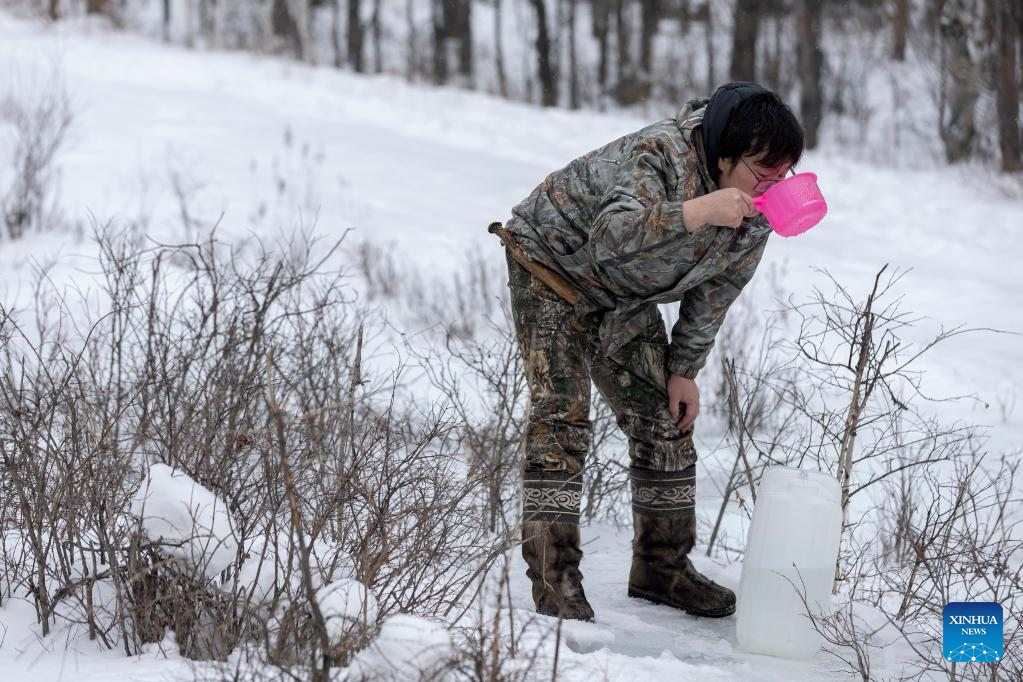
Juele drinks water at the Jinhe forest range near Genhe City, north China's Inner Mongolia Autonomous Region, Jan. 12, 2023.
Every two or three days, Juele Bulituotian will head for the Jinhe forest range about 80 kilometers from Genhe City. That's where the 39-year-old Aoluguya Ewenki herder, wearing a traditional fur coat, will find his foraging reindeer.
Instead of keeping reindeer in a barn, Ewenki herders let the animals live in the forest and check on them every couple of days.
Juele owns over 60 reindeer. He will call his reindeer in the Ewenki language and wait for his reindeer to respond. To him, the jingles of deer bells sound like heaven, which mean his reindeer are around, safe and sound.
"I need to make sure my reindeer are not too far away, nor threatened by the predators in the forest." said Juele.
The Aoluguya Ewenki people, known as "the last hunting tribe in China," are the only ethnic minority group in China that raises reindeer.
Before moving into the house provided free of charge by the local government, Juele spent his childhood in the deep forest with his mom. He once worked in Beijing, capital of China, after graduating from school, but every time he sat alone, the jingles from home echoed in his mind.
He eventually returned to Aoluguya, his hometown, in 2015 and began to raise reindeer.
Life in the forest is hard and lonely, let alone the extreme coldness one needs to suffer. In winter, temperatures in Aoluguya could drop to minus 50 degrees Celsius, but for Aoluguya Ewenki herders like Juele, life must go on.
At the end of 2022, Juele spent over eight hours every day in the snowy forest, looking for his reindeer. After nine days of search, he finally found his herd on New Year's Day.
"To me, that's the best New Year gift, which also means 2023 will be an auspicious year," Juele said.
According to Juele, the life of the Aoluguya Ewenki people has improved a lot in recent years thanks to the local government. New homes were provided to them for free, and mobile lodges were built in the forests for them to keep warm as well. Besides, the government has been making every effort to promote tourism, hoping to boost incomes for the Ewenkis.
"I already make a good living on reindeer breeding and tourism," Juele said. However, he is looking forward to the summer, when more tourists can be expected after the impact of COVID-19 lessens. "The tourism here is going to recover at that time, that's for sure," said Juele with confidence. (Xinhua/Fei Maohua)
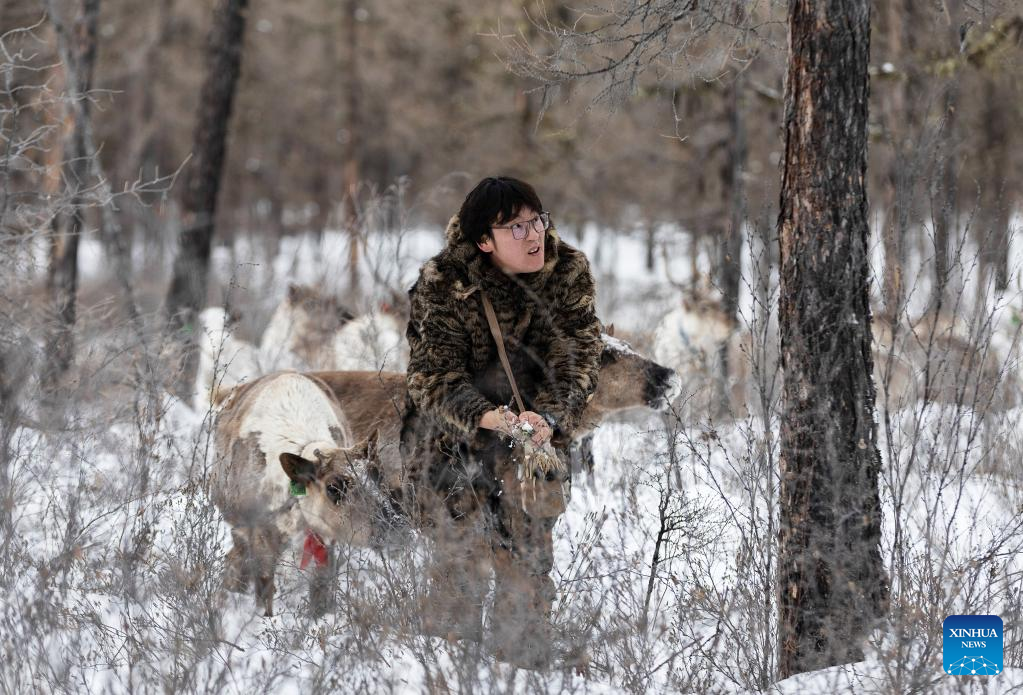
Juele washes his hands with snow before feeding his reindeer at the Jinhe forest range near Genhe City, north China's Inner Mongolia Autonomous Region, Jan. 12, 2023.
Every two or three days, Juele Bulituotian will head for the Jinhe forest range about 80 kilometers from Genhe City. That's where the 39-year-old Aoluguya Ewenki herder, wearing a traditional fur coat, will find his foraging reindeer.
Instead of keeping reindeer in a barn, Ewenki herders let the animals live in the forest and check on them every couple of days.
Juele owns over 60 reindeer. He will call his reindeer in the Ewenki language and wait for his reindeer to respond. To him, the jingles of deer bells sound like heaven, which mean his reindeer are around, safe and sound.
"I need to make sure my reindeer are not too far away, nor threatened by the predators in the forest." said Juele.
The Aoluguya Ewenki people, known as "the last hunting tribe in China," are the only ethnic minority group in China that raises reindeer.
Before moving into the house provided free of charge by the local government, Juele spent his childhood in the deep forest with his mom. He once worked in Beijing, capital of China, after graduating from school, but every time he sat alone, the jingles from home echoed in his mind.
He eventually returned to Aoluguya, his hometown, in 2015 and began to raise reindeer.
Life in the forest is hard and lonely, let alone the extreme coldness one needs to suffer. In winter, temperatures in Aoluguya could drop to minus 50 degrees Celsius, but for Aoluguya Ewenki herders like Juele, life must go on.
At the end of 2022, Juele spent over eight hours every day in the snowy forest, looking for his reindeer. After nine days of search, he finally found his herd on New Year's Day.
"To me, that's the best New Year gift, which also means 2023 will be an auspicious year," Juele said.
According to Juele, the life of the Aoluguya Ewenki people has improved a lot in recent years thanks to the local government. New homes were provided to them for free, and mobile lodges were built in the forests for them to keep warm as well. Besides, the government has been making every effort to promote tourism, hoping to boost incomes for the Ewenkis.
"I already make a good living on reindeer breeding and tourism," Juele said. However, he is looking forward to the summer, when more tourists can be expected after the impact of COVID-19 lessens. "The tourism here is going to recover at that time, that's for sure," said Juele with confidence. (Xinhua/Fei Maohua)
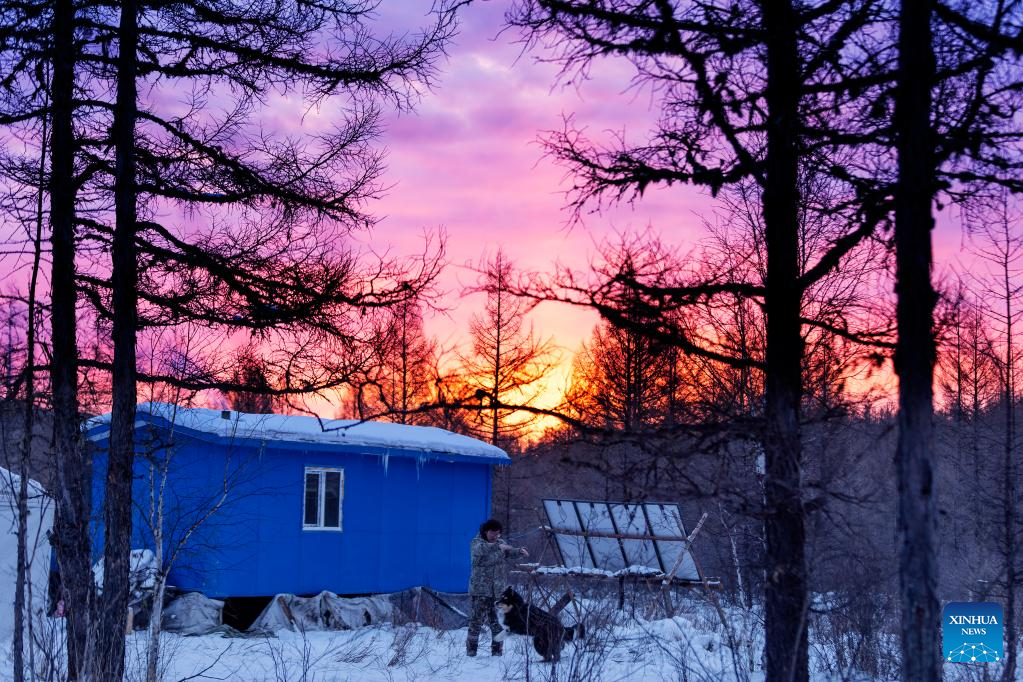
Juele calls his dogs in front of a mobile lodge, preparing to look for his reindeers, at the Jinhe forest range near Genhe City, north China's Inner Mongolia Autonomous Region, Jan. 12, 2023.
Every two or three days, Juele Bulituotian will head for the Jinhe forest range about 80 kilometers from Genhe City. That's where the 39-year-old Aoluguya Ewenki herder, wearing a traditional fur coat, will find his foraging reindeer.
Instead of keeping reindeer in a barn, Ewenki herders let the animals live in the forest and check on them every couple of days.
Juele owns over 60 reindeer. He will call his reindeer in the Ewenki language and wait for his reindeer to respond. To him, the jingles of deer bells sound like heaven, which mean his reindeer are around, safe and sound.
"I need to make sure my reindeer are not too far away, nor threatened by the predators in the forest." said Juele.
The Aoluguya Ewenki people, known as "the last hunting tribe in China," are the only ethnic minority group in China that raises reindeer.
Before moving into the house provided free of charge by the local government, Juele spent his childhood in the deep forest with his mom. He once worked in Beijing, capital of China, after graduating from school, but every time he sat alone, the jingles from home echoed in his mind.
He eventually returned to Aoluguya, his hometown, in 2015 and began to raise reindeer.
Life in the forest is hard and lonely, let alone the extreme coldness one needs to suffer. In winter, temperatures in Aoluguya could drop to minus 50 degrees Celsius, but for Aoluguya Ewenki herders like Juele, life must go on.
At the end of 2022, Juele spent over eight hours every day in the snowy forest, looking for his reindeer. After nine days of search, he finally found his herd on New Year's Day.
"To me, that's the best New Year gift, which also means 2023 will be an auspicious year," Juele said.
According to Juele, the life of the Aoluguya Ewenki people has improved a lot in recent years thanks to the local government. New homes were provided to them for free, and mobile lodges were built in the forests for them to keep warm as well. Besides, the government has been making every effort to promote tourism, hoping to boost incomes for the Ewenkis.
"I already make a good living on reindeer breeding and tourism," Juele said. However, he is looking forward to the summer, when more tourists can be expected after the impact of COVID-19 lessens. "The tourism here is going to recover at that time, that's for sure," said Juele with confidence. (Xinhua/Fei Maohua)
Photos
Related Stories
- Hohhot: Ravishing ecology showcases high-tech green development
- Awe-inspiring winter world draws visitors to Hulunbuir
- North China's once-dwindling Hulun Lake grows in size, health
- Emerald-like Ulansuhai Nur in Inner Mongolia
- China Focus: Coal base ramps up energy supply for winter needs
- Camels move to winter pasture in Badain Jaran Desert
- Colorful light beams appear in skies of Inner Mongolia
- 5-year-old masters grassland skills
- Beautiful early winter scenery of Ergun Wetland in N China's Inner Mongolia
- Ecoprotection efforts boost Inner Mongolia
- Call of the wilderness - village idyll
Copyright © 2023 People's Daily Online. All Rights Reserved.









